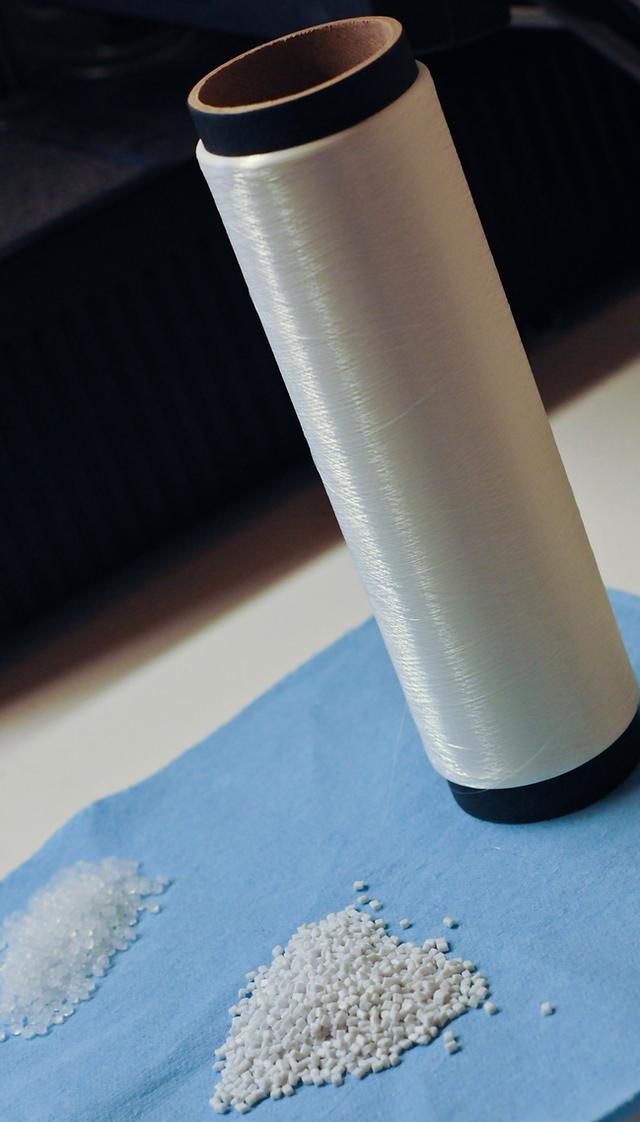University of Rhode Island professor and textile engineer Izabela Ciesielska-Wrobel is working to give ocean plastics a new life in fashion.
Together with Robert Torgerson, president and founder of Kestrel Innovation Technologies, Wrobel is working to identify if ocean plastic can be recycled and turned into new textiles.
Wrobel was first introduced to this idea when she was a research scientist at Luna Innovation Incorporated in Virginia. The Department of Energy sent out a project call asking for solutions to the ocean waste problem, and ideas of potentially turning the waste into another kind of material.
This led Wrobel to start researching ocean plastics.
“I did not know there was so much plastic garbage in the ocean,” Wrobel said. “The more I read, the more I thought that this was a task for a textile engineer.”
Wrobel explained the different fibers used in clothing. There are natural fibers such as cotton, wool, linen and cashmere, and then there are synthetic fibers made from plastics like polyester, nylon and acrylic.
When clothing gets washed, microfibers come off of the clothing. Then, they enter the water supply as there are currently no filters small enough in washing machines to catch the fibers.
According to Wrobel, this is one avenue for microplastics to end up in the ocean, and once they are there, the synthetic fibers can be damaging to marine ecosystems.
“They can have different chemicals, colorants and additives, and they can float forever releasing those microplastics,” Wrobel said.
Wrobel is currently working to obtain different types of plastic from the ocean, and uses an extruder machine to turn the fibers into filaments that can be made into textiles.
“”Right now we are thinking about what sort of material we should use, how it should be used and how to process it,” Wrobel said.
Torgerson is also working to find potential additives to make the recycled plastic fibers easier to work with and better suited for making back into textiles.
The recycled material is generally weaker than new, virgin materials, according to Wrobel.
The team received the initial round of plastics from OceanWorks Incorporated, a company that reclaims plastic waste from the ocean to be recycled into new products. That batch of plastic pellets were a mixture of plastics from different sources and were difficult to extrude.
The team is now going to be working with plastic pellets made from fishing nets found in the ocean. Since these polymers are more closely related to textiles, it is hypothesized that they will be better suited for the task of becoming new material.
The project is still in early stages, but the researchers see promise in the idea.
Katherine Shannon, assistant to the VPR of Strategic Initiatives at URI, works to connect researchers across departments to do interdisciplinary research.
Torgerson, who was then working in medical textiles, contacted Shannon about the ocean textile project.
“He [Torgerson] felt that the language he spoke in healthcare could be translated over into textiles in the environment,” Shannon said. She connected him with Dr. Wrobel, and the two have been working together ever since.
Dr. Wrobel also works with graduate student Payton Becker. Becker is in her second year of a master’s program in the textile merchandising and design (TMD) department with a specialization in historical textiles and textile conservation.
Becker was offered a research assistantship in Dr. Wrobel’s textile science lab, and works with Wrobel to extrude fibers from the plastic pellets. To incorporate more sustainability into their wardrobes, Becker recommends that students give clothing a second life by thrifting.
She recommends threadUP as a good option for finding thrifted clothes, as it is an online platform that allows users to easily sort options by size and material, and your thrifted clothes will be delivered to you.
She also recommends that students think about what they are purchasing.
“You can choose core, timeless pieces and add maybe one additional piece per season rather than revamping your whole wardrobe,” Becker said.
If the efforts of the research team are successful, repurposing plastic waste from the ocean into textiles will be a big step for sustainability.
“You’re reducing the plastic in the ocean, and you’re reducing the need to make new plastic,” Becker said.
Dr. Wrobel’s lab is just one of the many interdisciplinary labs across campus that are working to make changes in science and society.
“I think URI’s faculty are very talented in this collaboration field,” Shannon said. “They’re applying their research in ways that can make a difference, and they are looking to have that collective impact.”
Could recycled ocean plastics be the new fashion trend? Dr. Wrobel and her team are going to find out.

